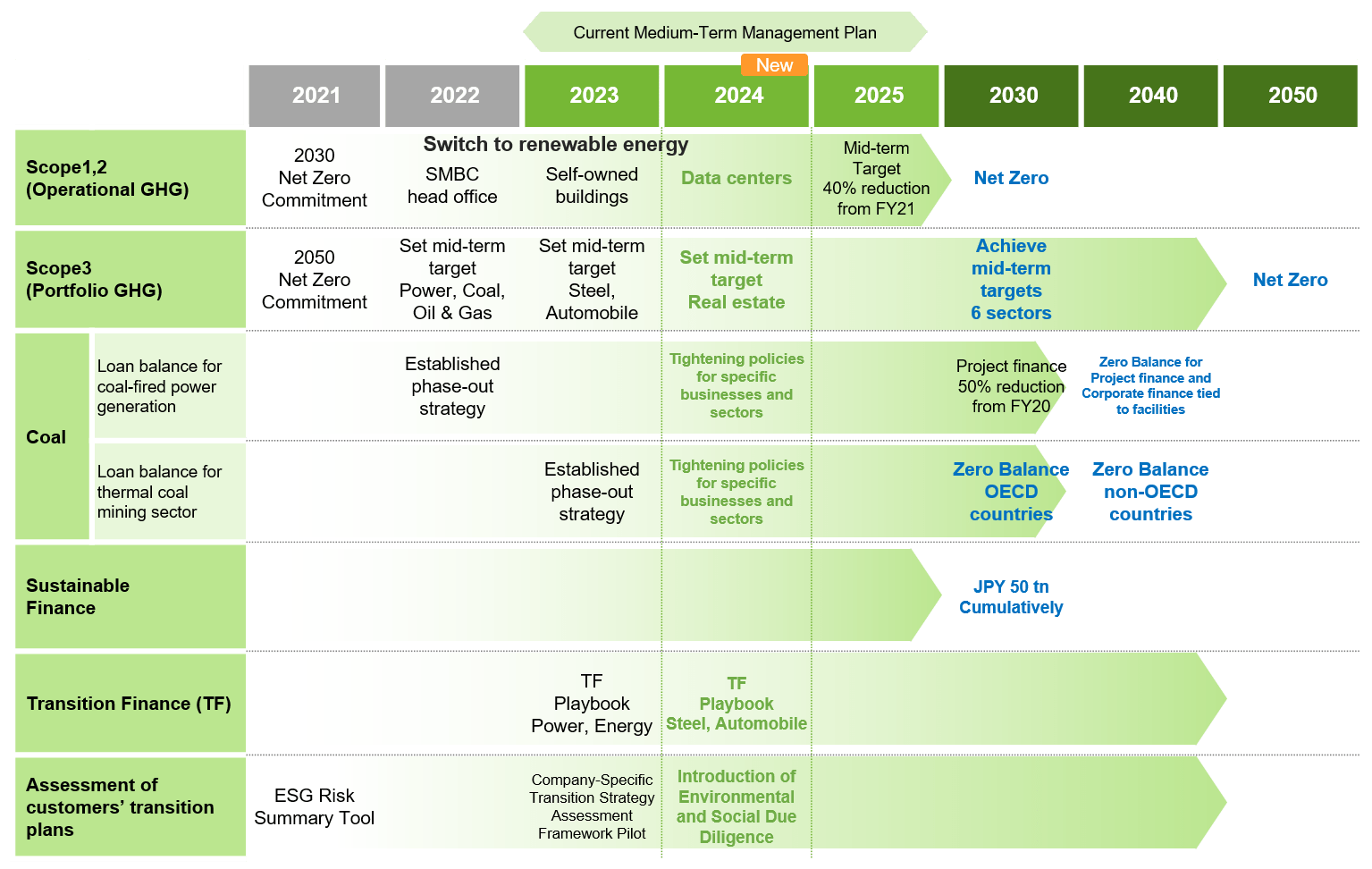

Response to climate change
Our approach against climate change
Climate change is one of the most important social issues that the world must urgently address. SMBC Group believes that contribution to decarbonization of the real economy is the biggest role that financial institutions should play in achieving net zero emissions. We aim to achieve this alongside SMBC Group’s own achievement of net zero. There is no single optimal path to decarbonization; the path varies by country and sector. Accordingly, rather than merely withdrawing funding from high-emission sectors, SMBC Group will support customers’ transitions and technological innovation with understanding of their individual circumstances. We engage in support that leverages our strengths, matched to customers’ strategies and needs.
Transition Plan for achieving net zero in 2050
SMBC Group aims to achieve net zero for our own greenhouse gas emissions by 2030, and for our entire loan and investment portfolio by 2050. We have adopted the methodology in the GHG Protocol Corporate Standard and financial sector-specific programs*1 for our emissions accounting*2 and systemized the series of targets and actions in the "Transition Plan."
*1 The calculation of Category 15, Scope 3 emissions (financed emissions) is conducted with reference to the methodologies set out in The Global GHG Accounting & Reporting Standard for the Financial Industry and the Paris Agreement Capital Transition Assessment (PACTA) as discussed in our Sustainability Report.
*2 We have also obtained limited assurance for our Scope 1 and Scope 2 Greenhouse Gas emissions from KPMG AZSA Sustainability Co., Ltd.
Summary of our Transition Plan for Achieving Net Zero
Overview of Initiatives Towards Achieving Net Zero
Sustained Efforts to Address Climate Change
SMBC Group outlines its approach to climate change initiatives in accordance with the four recommended components of international sustainability disclosure standards: governance, strategy, risk management, and metrics and targets. For more details, please refer to the "SMBC Group Sustainability Report."
* For details up to the fiscal year 2023, please refer to the "SMBC Group TCFD Report."
Management of Environmental Risks
SMBC Group appropriately manages its policies, portfolio management, and individual company and project management to achieve its net-zero targets. For more details, please refer to the "SMBC Group Sustainability Report."
Policies
<Policies for Specific Businesses and Sectors>
SMBC Group has introduced policies for businesses and sectors which are likely to have significant impacts on the environment and society. These policies are independently determined in relation to risk management. They are rolled out to SMBC Group companies, including Sumitomo Mitsui Banking Corporation, SMBC Trust Bank, Sumitomo Mitsui Finance and Leasing Company and SMBC Nikko Securities, in line with their businesses, and to enhance their risk management system continuously. The application of this Policy remains subject to compliance with local legal requirements.
For more information, please refer to the link below.
Coal-Fired Power Generation and Thermal Coal Mining
We are working to tighten our loan policies and to formulate phase-out strategies. Specifically, we have clearly stated that we will not support newly planned or expansion of projects . Additionally, we have set the following targets for reducing loan balances to zero:
(Coal-Fired Power Generation) Zero loan balance by the fiscal year 2040
(Thermal Coal Mining) Zero loan balance by the fiscal year 2030 in OECD countries and by the fiscal year 2040 in non-OECD countries
Biomass Energy Generation
In fiscal year 2023, we introduced a new policy for biomass power generation projects, requiring the confirmation of the use of sustainable biomass materials for the new construction and expansion of woody biomass energy generation plants.
Portfolio Management
<Risk Appetite Framework (RAF)>
In fiscal year 2023, we established a new climate-related category within our RAF, which is the framework for our group-wide risk management. Within this framework, we have set indicators related to Scope 3 emissions with a focus on sectors for which we have set mid-term reduction targets, and are raising the level of our management to achieve these targets.
<Environmental and social due diligence>
We assess risks from both environmental and social perspectives for corporate and project-related matters and use the assessment results as a factor in credit decisions. We also conduct engagement with customers based on those results.
* In addition to conventional screening, assess and evaluate how environmental and social risks may impact credit and reputational risks, and make informed, comprehensive decisions accordingly.



